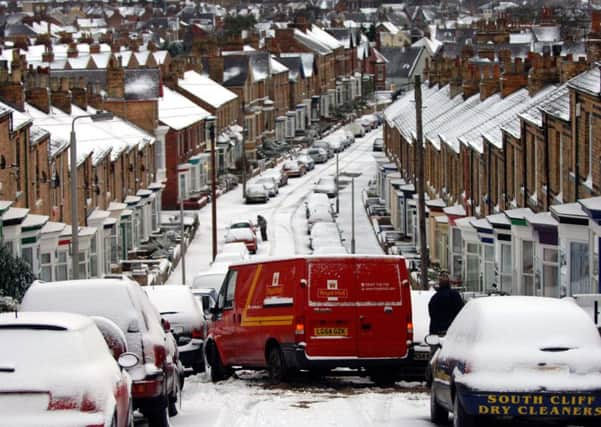How to give your home a winter MOT


As the temperatures plunge this winter, the RICS - Royal Institution of Chartered Surveyors - is calling on homeowners in Yorkshire to keep safe and warm, and avoid paying out for costly repairs and high heating bills.
Graham Ellis, RICS Associate Director Residential, says: “The winter weather can wreak havoc on a home, resulting in all kinds of avoidable repairs; from freezing pipes, flooding and damp, blocked air vents to broken windows and cracked roofs. To avoid such damage, think roof, walls, gutters and downpipes, floors, windows, doors – and even the garden if you have one - then repair, seal, insulate and secure wherever possible.”
Advertisement
Hide AdAdvertisement
Hide AdGraham says energy saving measures need not cost the earth and his top tips include:
*Firstly, stop wasting energy. Where possible, turn off the radiators in rooms that aren’t in use. But make sure you keep the doors shut too, so that the heat from the rooms you’re using doesn’t escape. Draught-proof by sealing gaps around windows and doors. Cracks and gaps around doors and windows can leak heat, so seal these up too using inexpensive insulating strips or even blankets. Fit a cover over a letterbox and, where possible, use thicker curtains for the windows or line your current curtains as that will provide optimal warmth.
*Service your boiler and keep pipes toasty. A poorly maintained boiler wastes more energy and costs more to run, so get it serviced or change your old model for a condensing boiler, which could shave off around £235 a year, according to the Energy Saving Trust. Meanwhile, insulate pipes with a cheap foam cardigan, better known as lagging, to stop them from freezing. You can buy lagging from DIY stores.
*Reflect radiator heat. If you have radiators on external walls, line them with aluminum foil to reflect the heat back into the room instead of letting it escape through the wall. You can use ordinary kitchen foil, but heat reflector aluminium foil sheets (also called radiator reflector panels) are far more effective and cost from around £8. Also ensure that you bleed your radiators if they are colder at the top than they are the bottom. This will release the trapped air and will ensure they run much more efficiently.
Advertisement
Hide AdAdvertisement
Hide Ad*Insulate. There are many simple, yet effective ways to insulate your home which aren’t too costly and can significantly reduce heat loss while lowering your heating bills. Take a look at the Energy Saving Trust’s website for a range of options - including insulating your loft. A quarter of the heat is lost through the roof in an uninsulated home. Loft insulation is effective for at least 40 years and it should pay for itself many times over. National Insulation Association members agree to follow a code of professional practice, www.nia-uk.org.
*Prepare/restore the exterior of your home. Repair any loose or cracked tiles and consider fitting a chimney balloon (from around £20 online) as it stops warm air going up your chimney and draughts coming back down. Remove any blockages of leaves and debris from your gutters and drainpipes too, as once the blockage becomes too much, water may leak into the roof and down the walls of the house, causing damp. Also ensure that wall surface and pointing is weatherproof.
*Garden. Repair and secure fences, sheds and gates to prevent gale force winds from blowing them into your home and causing costly damage.
Graham adds: “Following these tips not only help you to keep warmer, safer and at less risk of paying out for costly repairs, but they’ll also reduce your energy bills along the way.
Advertisement
Hide AdAdvertisement
Hide Ad“If in any doubt about how to prepare your home for winter, a local RICS surveyor can assess the state of your property by undertaking an RICS Home Condition Report. This will uncover any problems that may require varying degrees of attention and the surveyor will be able to provide advice on how to rectify and such issues.”
*To find a surveyor in your local area visit www.ricsfirms.com . For those that live in flood risk areas, RICS has created a free publication www.rics.org/flooding